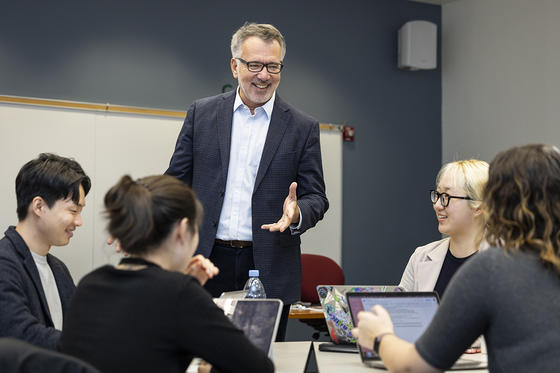Eighteen George Mason University programs are ranked the best in Virginia in a new report by EduRank that focuses on performance in research.

Topping the list is Mason’s entrepreneurship ecosystem, which for the second consecutive year was ranked No. 1 among all public institutions and No. 2 among all institutions nationally.
Best-in-Virginia programs were spread across the university and included those from the Costello College of Business, the Schar School of Policy and Government, the College of Engineering and Computing, the College of Humanities and Social Sciences (CHSS), the Jimmy and Rosalynn Carter School for Peace and Conflict Resolution, the College of Visual and Performing Arts, the Antonin Scalia Law School, the College of Education and Human Development, and the ROTC.
That research is supported by entities such as the Office of Research, Innovation, and Economic Impact, which has overall responsibility for Mason’s research enterprise and support of entrepreneurship and innovation. And Costello College’s Center for Innovation and Entrepreneurship lets students dig into entrepreneurship, from the theoretical to the experimental.
Mason’s entrepreneurial ecosystem is anchored by the university and reaches out into the broader community. Mason Enterprise, a division of the Office of Research, Innovation, and Economic Impact, is a strategic collection of 24 programs that support entrepreneurs and small business owners across Virginia, and conducts more than 1,500 training programs and more than 30,000 hours of one-on-one counseling with entrepreneurs in the community and from universities each year.
It is that environment of research, discovery, and innovation, which is a main contributor to Mason’s R1 designation from the Carnegie Classification of Higher Education as one of the nation’s top research universities.
And though the EduRank rankings focus mainly on research performance, they are an indicator of the quality of the programs from which that research is produced.
“Mason is committed to accelerating the translation of research into practice by leveraging university talent, infrastructure, and partnerships to create solutions for societies’ toughest challenges at speed and scale,” said Andre Marshall, Mason’s vice president for research, innovation, and economic impact. “It is a credit to our faculty and students that Mason is a place where we can put theory into practice.”
Added Paula Sorrell, Mason’s associate vice president of innovation and economic development, “Mason was originally created by the business community to serve its needs, and for 50 years it has been doing just that. In the past four years, we’ve significantly amped up our tech entrepreneurship to support and mirror the rapidly growing tech economy, adding 16 new programs and counting.”
Research is the bedrock of entrepreneurship, Costello College dean Ajay Vinzé said.
The university’s top rankings “are in many ways reflective of our approach to business education and the business of higher education,” he said. “Our approach—built on the foundation of a rich university-wide entrepreneurial ecosystem, powered by a growing body of faculty research across multiple fields of study—is changing the arc of higher education expectation and delivery as we prepare the next generation of leaders.”
Costello College is a contributor to the top entrepreneurship ranking, along with the Schar School and the Mercatus Center, all of which produce volumes of research, articles, and papers for an abundance of publications.
Schar School dean Mark J. Rozell called entrepreneurship research “a very distinguishing feature for a public policy and government school.”
Its research at the Center for Micro-Economic Policy Research (CMEPR), for example, is focused on diversity and disadvantaged groups among entrepreneurs, especially those who are Black, immigrants, and female. It also looks at job creation by minority entrepreneurs in minority and low-income communities.
“The center brings an unusual contribution to research on entrepreneurship by focusing on these issues,” said John Earle, the center’s director and a Distinguished University Professor, who has published more than 60 articles and scholarly papers. “While the typical focus for entrepreneurship studies is for performance, especially for firms receiving venture-capital support, CMEPR research analyzes a much broader range of businesses, and how public policies affect the entry, growth, and survival of those owned by minority entrepreneurs.”
At the College of Engineering and Computing, Dean Ken Ball noted that CEC faculty garnered more than $119 million in research awards in 2023.

“I’m proud that our research has informed and strengthened our academic programs and led to innovation and economic growth that benefits society,” Ball said. “Mason has consistently been a national leader in cybersecurity, data analytics, software engineering, aviation, and web development. These rankings reflect the impact CEC researchers have in areas of engineering and computing that are relevant to everyone, as well as our leadership position among Virginia’s public universities.”
CHSS dean Ann Ardis said her college’s contributions to research in best-of-Virginia areas such as criminology, broadcasting, law enforcement, journalism, and political economy “are a testament to the scholarly excellence of our faculty. We take immense pride in our researchers’ contributions to Mason’s growing reputation nationally as a comprehensive R1 institution with strengths across a range of research areas.”
For Alpaslan Özerdem, dean of the Carter School, the ranking in conflict resolution “fuels our dedication to shaping a more peaceful and understanding world.”
Özerdem noted that the school has been at the forefront of teaching, researching, and implementing conflict resolution for four decades.
“So being recognized as the premier institution for conflict resolution in Virginia deepens our pride and reaffirms our vital role within the broader conflict resolution ecosystem of the commonwealth,” he said.
Here are the programs ranked the best in Virginia, with ranking among public institutions and overall national ranking; best in Washington, D.C., Virginia and Maryland (DMV) where noted:
Aviation: 8, 11 (best in the DMV)
Broadcast Journalism: 40, 58
Cinematography: 29, 48 (best in the DMV)
Conflict Resolution: 15, 28
Criminology: 19, 26
Cybersecurity: 21, 33
Data Administration: 19, 29
Entrepreneurship: 1, 2 (best in the DMV)
Human Rights Law: 9, 28 (best in the DMV)
Intellectual Property Law: 6, 18 (best in the DMV)
Law Enforcement: 5, 10 (best in the DMV)
Military Science: 33, 47
Political Economy: 14, 28
Public Policy Administration: 17, 29 (best in the DMV)
Radio & TV Broadcasting: 37, 55
Remote Sensing: 29, 39
Software Engineering: 11, 15
Web Development: 12, 18
See EduRank’s methodology here.
Related News
- February 2, 2026
- January 27, 2026
- January 5, 2026
- November 20, 2025
- November 18, 2025
